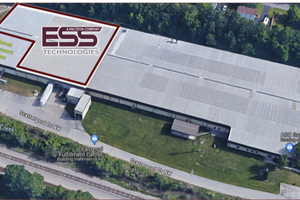October 1, 2000
Originally Published October 2000
HOTLINE
Acrylic-based Multipolymer Compound Withstands Alcohol and Lipids
The compound is suited for molding a variety of device components
Developed for device applications that require a high level of chemical resistance, an acrylic-based multipolymer compound reportedly offers better alcohol and lipid resistance than polycarbonate and exhibits improved alcohol resistance compared with other acrylic materials.
"This is the first alcohol-resistant acrylic," says Stephen Magaziner, business manager, modified acrylics and alloys, at Cyro Industries (Rockaway, NJ). "Cyrolite Med is suited for use with components that may be wiped down with alcohol and where there is concern about the fittings where two parts mate," he adds. Typical medical applications of the material include filter housings, luers, IV connectors and accessories, spikes, y sites, check valves, pumps, catheter adapters, and caps and funnels for blood filters.
 An acrylic-based multipolymer compound can be processed at low temperatures, making it suitable for use in thin-walled and difficult-to-mold parts.
An acrylic-based multipolymer compound can be processed at low temperatures, making it suitable for use in thin-walled and difficult-to-mold parts.
Magaziner adds that Cyrolite Med shows no deterioration following sterilization at typical gamma or E-beam radiation levels; it also withstands EtO sterilization.
The company also recently launched a static-dissipative acrylic multipolymer compound. Developed for injection molding applications and available in pellet form, ClearStat C-37 provides permanent electrostatic discharge protection for electronic parts. Medical applications of the product, according to Magaziner, include devices in which a static charge affecting airflow may be a concern.—Norbert Sparrow
Surface Design Technology Improves MCAD Capabilities
New tools create a collaborative design atmosphere
New free-form surfacing technology has been developed to complement existing parametric surface design tools in Pro/Engineer. Parametric Technology Corp. (PTC;Waltham, MA), a provider of mechanical computer-aided design (MCAD) and collaborative product commerce, revealed plans to make the new technology available to the public later this year.
Part of PTC's Pro/Engineer suite of integrated MCAD solutions, the software will provide a natural, more mainstream alternative to PTC's CDRS product line. "The interactive surface design technology will be the next step in PTC's all-in-one platform strategy, which will deliver the ultimate enterprise process integration between industrial design and engineering," said Jon Stevenson, general manager and senior vice president, MCAD, at the company.

Applications for Foster Fluorogard MG polymer additives include catheters, prosthetics, and injection molded medical devices.
The technology will enable users to work directly with curves, surfaces, and facets, allowing for quick design realization and modification. PTC's integrated free-form surfacing design capabilities, along with its Pro/Engineer parametric surface design tools, are designed to create a completely collaborative environment for product designers.
With a strong connection to engineering, projects can be transferred between engineering and designing software and worked on concurrently. Changes can be communicated to all groups and suppliers that are involved in the product development process. The new program uses soft-point technology that will result in lighter, more-flexible curves, and quick, intuitive, dynamic interaction with models.
—Katherine Sweeny
Lubricated Medical-Grade Compounds Facilitate Material Processing
Applications include catheters and hip joints
Medical-grade compounds lubricated with DuPont Fluoroguard MG polymer additives feature improved flow properties and enhanced processability and throughput. The product was introduced by Foster Corp. (Dayville, CT), which reached an agreement with DuPont to use the inert additives in its products worldwide.
"We see a multitude of medical applications," says Lawrence A. Acquarulo Jr., president of Foster Corp. "It can be used in the manufacture of any type of catheter or medical device in which silicone or Teflon is typically used, any medical device that is injection molded, and where lubricity is desired. Other applications could very well include prosthetic devices and hip joints, where surface wear could be a problem," he adds.
Processing benefits of the lubricated material include less wear and abrasion on the mold and a reduction in overall mechanical stress. Despite the improved processability, the chemical properties of the materials being compounded are not affected. Fluoroguard is purified to meet USP Class VI requirements for polymer additives and has been tested by NAMSA. It is compatible with most thermoplastics and elastomers.
—Rosemarie A. Santora
Medical Product Manufacturing News is always on the lookout for innovative products and services. If you are aware of any that have recently been or are about to be introduced, please call the Hotline desk at 310/445-4267.
Back to the MPMN table of contents | Back to the MPMN home page
Copyright ©2000 Medical Product Manufacturing News
You May Also Like


